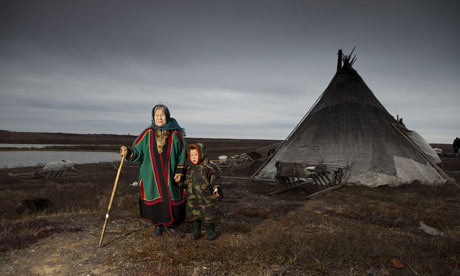Climate change in Russia's Arctic tundra: 'Our reindeer go hungry. There isn't enough pasture'
By Luke Harding in Marresale, on the Yamal peninsula For 1,000 years the indigenous Nenets people have herded their reindeer along the Yamal peninsula. But their survival in this remote region of north-west Siberia is under serious threat from climate change as Russia’s ancient permafrost melts
By Luke Harding in Marresale, on the Yamal peninsula It is one of the world’s last great wildernesses, a 435-mile long peninsula of lakes and squelching tundra stretching deep into the Arctic Ocean. For 1,000 years the indigenous Nenets people have migrated along the Yamal peninsula. In summer they wander northwards, taking their reindeer with them, across a landscape of boggy ponds, rhododendron-like shrubs and wind-blasted birch trees. In winter they return southwards. But this remote region of north-west Siberia is now under heavy threat from global warming. Traditionally the Nenets travel across the frozen Ob River in November and set up camp in the southern forests around Nadym. These days, though, this annual winter pilgrimage is delayed. Last year the Nenets, together with many thousands of reindeer, had to wait until late December when the ice was finally thick enough to cross. “Our reindeer were hungry. There wasn’t enough pasture,” Jakov Japtik, a Nenets reindeer herder, told the Guardian. “The snow is melting sooner, quicker and faster than before. In spring it’s difficult for the reindeer to pull the sledges. They get tired,” Japtik said, speaking in his camp 25kms from Yar-Sale, the capital of Russia’s Arctic Yamal-Nenets district. Herders say that the peninsula’s weather is increasingly unpredictable – with unseasonal snowstorms when the reindeer give birth in May, and milder longer autumns. In winter temperatures used to go down to -50C. Now they are typically -30C, according to Japtik. “Obviously we prefer -30C. But the changes aren’t good for the reindeer and ultimately what is good for the reindeer is good for us,” he said, setting off on his sled to round up his itinerant reindeer herd. … Russia – the world’s biggest country by geographical area – is already warming at one and a half times the rate of other parts of the world. If global temperatures do go up by the 4C many scientists fear, the impact on Russia would be disastrous. Much of Russia’s northern region would be turned into impenetrable swamp. Houses in several Arctic towns are already badly subsiding. …
Climate change in Russia’s Arctic tundra: ‘Our reindeer go hungry. There isn’t enough pasture’ via Apocadocs
